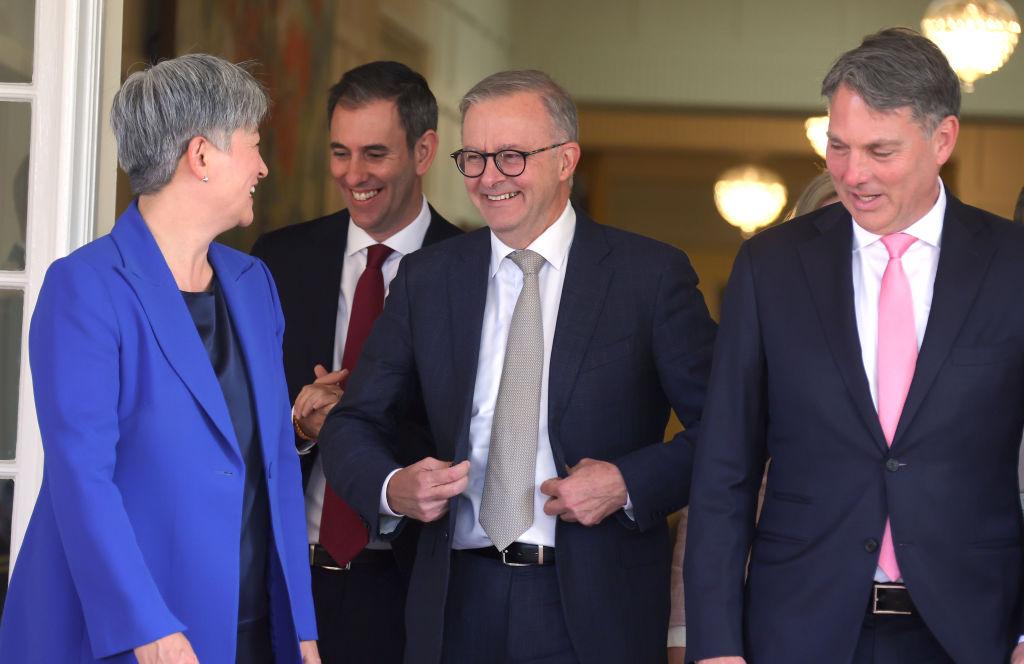
At the mid-point of Labor’s three-year term, the international strategy and statecraft of the new government is more fully formed than its domestic identity.
Global turmoil—the polycrisis—has quickly tested and tempered the government’s world view.
Whatever its political instincts or policy hopes, Labor has run a grimly realist foreign policy seeking a balance of power in the Indo-Pacific. Just as the government restored bilateral equilibrium with China, so it seeks regional equilibrium. Times are tough when just getting some balance is the height of Canberra’s hopes.
The government’s 18-month achievement has been getting stability with China while embracing the AUKUS deal with the United States and the United Kingdom. Balance, indeed. Prime Minister Anthony Albanese’s twin trips to Washington and Beijing were highlights of a complex work in progress.
Labor has defined itself internationally; not so, domestically. Normally, at the mid-point of its term, a new government’s story to the voters is firming into place. Delivering a couple of budgets does wonders in forcing a government to choose. By their decisions, ye shall know them. Yet Labor has been buffeted domestically as much as it has been tested internationally. While some foreign policy returns are in, the domestic time of truth arrives next year.
Coming out of the Covid cave, Australians have been hit by inflation and a cost-of-living crunch. Whether from grumpiness or dollar pressures, the nation was in no mood to ponder history and write First Nations peoples into the constitution. Holding the Voice referendum spoke well of Albanese’s ambition and optimism; the failure asked how well his government could talk to—or understand—its people. The kindest view is that the Voice loss is just history repeating, as Australia again rejected a Labor referendum.
The political effect is that a government with the narrowest of majorities must reintroduce and redefine itself to the voters during the 18-month sprint to the next election.
The opposition has been wailing about ‘Airbus Albo’, arguing that the prime minister spends too much time overseas enjoying foreign exotica, when he should be at home mowing the lawn and paying bills. See that as political ju-jitsu, trying to turn an opponent’s strength into a weakness. The fact check says Albanese is on trend with his predecessors: 18 overseas trips in 18 months, nudging him ‘slightly ahead of former prime ministers Scott Morrison (17 trips) and Tony Abbott (16) at the same point in their tenure’.
Where Albanese is unique is that no previous PM left the country the day he took office: after being sworn in, Albanese zipped to the parliament building for a press conference, then flew to Japan for a Quad summit. That first day set the model for a government that had to confront foreign policy as the most pressing of priorities. It makes for a different—even unusual—Labor government.
Outward-facing international portfolios are held by those in command. For the first time since the Whitlam government (1972–1975), Australia’s defence minister is also the deputy prime minister, Richard Marles. Labor’s Senate leader is the foreign minister, Penny Wong, while the Senate deputy leader is the trade minister, Don Farrell. The treasurer, Jim Chalmers, says the economic downturn in China is one of the two biggest risks facing Australia’s economy.
The foreign minister’s most important diplomatic relationship is always with the prime minister. And that makes Wong central to this government because she is the PM’s close factional ally and friend. The ABC’s Brett Worthington posited recently that Wong is actually Australia’s second-in-command, ahead of Marles:
A deputy leader typically gets whatever portfolio they want. Insiders say Marles wanted to be the foreign minister but knew it was a job he could never gain while Wong was in the parliament. Many in Labor see Wong as Albanese’s praetorian guard and enforcer, the person tasked with keeping those with leadership aspirations in check (looking at you, Treasurer Jim Chalmers).
The press gallery view is that Wong runs a tighter office than Marles, but that may merely reflect the fact that Defence is an unruly big beast. The beast is an expensive animal to feed, as the AUKUS submarines will prove.
Labor has grasped the AUKUS chalice bequeathed by Morrison’s Coalition government and made the policy its own. Whether the chalice is jewelled or poisoned or both, Kim Beazley notes that AUKUS was resoundingly endorsed by Labor’s national conference. The former Labor leader says the agreement ‘represents the most important revolution in Labor’s approach to defence policy in 60 years’.
Labor has tried to sell its strategic vision by constant use of the word ‘statecraft’, to bring defence and foreign policy together with broader elements of economic policy. The statecraft mantra offers product differentiation from the previous government’s banging of the defence drum. Certainly, statecraft is a useful idea for a powerful foreign minister seeking to give her department a bigger role at the top table, countering chronic underfunding over decades that has inflicted bureaucratic anaemia on the Department of Foreign Affairs and Trade.
The statecraft story Labor can tell after 18 months is strong: rebalance with China, reach higher with the US alliance, and reassure the South Pacific by changing Australia’s story on climate change. In her first year as foreign minister, Wong made 10 visits to the South Pacific, fulfilling the promise to go to the 17 other members of the Pacific Islands Forum. The Falepili Union with Tuvalu is a ‘a grand bargain, albeit in microcosm’ that could offer much to the islands.
The international work to rebalance, reach higher and reassure is a model for a government that must use the next 18 months to reconnect with voters.

